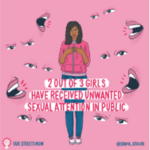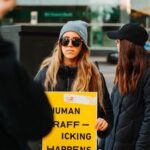Our Campaign
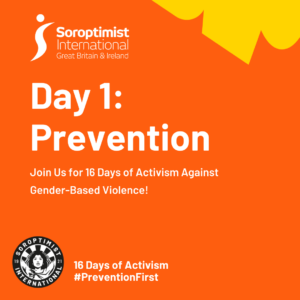 We are taking part in the UN International Campaign of 16 Days of Activism to end Gender Based Violence; 25th November to 10th December 2024. This year’s theme is prevention
We are taking part in the UN International Campaign of 16 Days of Activism to end Gender Based Violence; 25th November to 10th December 2024. This year’s theme is prevention
Internationally, Orange is the colour theme for this campaign. As Soroptimists, we are aiming, over the 16 Days, to highlight the impact of Violence against Women and Girls – both locally and nationally in the UK by holding a number of ‘Orange’ events here in Kenilworth.
Background Information
Violence against women and girls…
means any act of gender based violence that results in, or is likely to result in, physical, sexual or psychological harm or suffering. This includes threats of such acts, coercion or arbitrary deprivation of liberty, whether occurring in public or private life.
Domestic Abuse
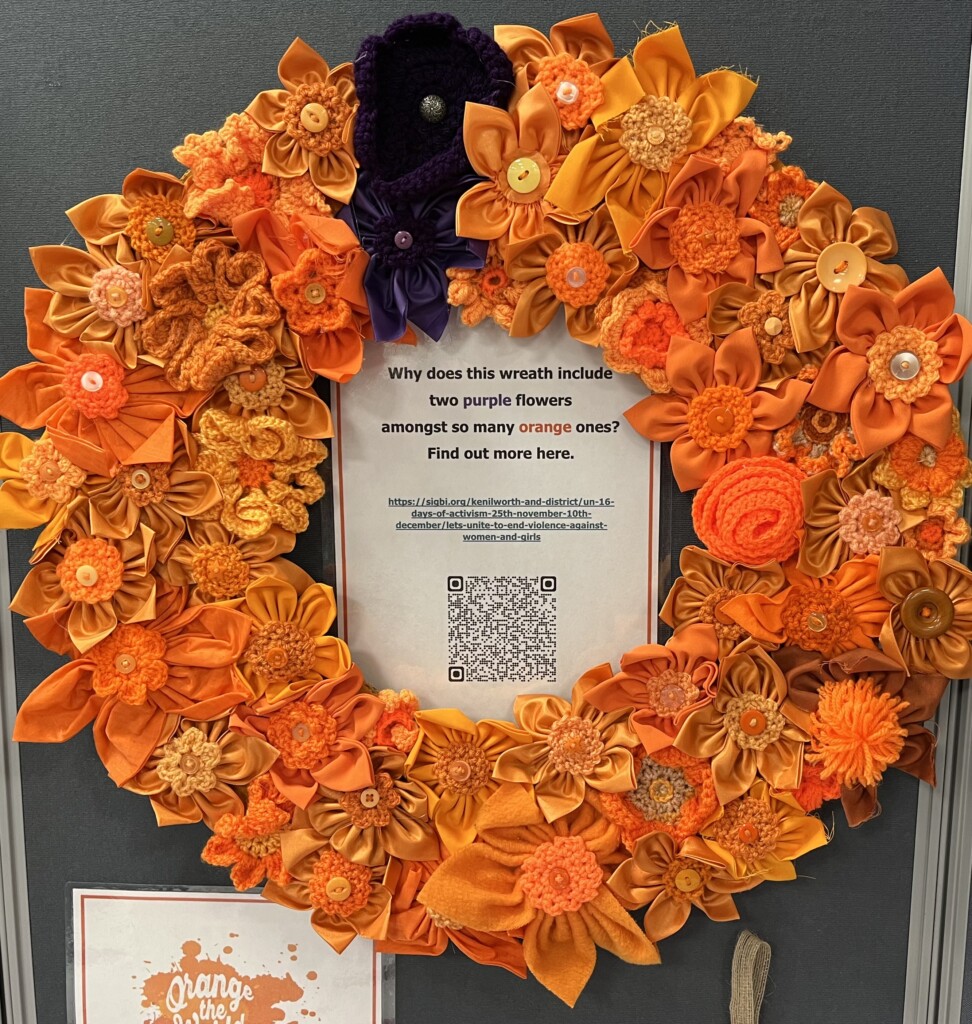
The Crime Survey for England and Wales estimates that there are 2.3 million victims of domestic abuse each year. Two thirds are women. More than 2 women a week are killed by a current or former partner in the UK.
The police recorded 1.5 million abuse-related incidents and crimes in England and Wales in the year ending March 2022. The number of domestic abuse-related crimes increased by 7.7% compared to the previous year.
The UN states that globally, 81,000 women and girls were killed in 2020 (58% at the hands of an intimate partner or family member) which equates to a woman or girl killed every 11 minutes in their home.
The National Policing Statement 2024 doesn’t make any better reading.
Violence Against Women and Girls (VAWG) has reached epidemic levels in England and Wales, in terms of its scale,
complexity and impact on victims. We have seen a 37% increase in recorded VAWG related crimes from 2018/19 to 2022/23
and we estimate that at least 1 in every 12 women will be a victim of VAWG every year (2 million victims) and 1 in 20 adults
in England and Wales will be a perpetrator of VAWG every year (2.3million perpetrators). These are cautious estimates as we know much crime goes unreported and in policing, we often only see the tip of the iceberg.
Since February 2023 VAWG has been classified as a ‘national threat to public safety’ (same category as terrorism and organised crime)
- VAWG offences equate to 20% of all police recorded crime.
- 1 in 6 homicides were domestic abuse related (12 months up to March 2023)
- Between 2020 – 2023 suspected victim suicides following domestic abuse increased year on year, almost doubling (51 – 93 suicides)
- After 1 month, 75% of 2,106 sexual assault survivors met the criteria for PTSD
- 28% victims known to the police (source: Home Office ‘Domestic Homicide Project’ 2024).
Any safer in the work place?
Sadly the answer is no.
- 30% of UK working population (10 million+) experience a form of workplace sexual harassment . At least 40% of women experience sexual harassment during their careers (source: Lloyds Register Foundation 2023)
- 40% of women who suffer domestic abuse are prevented from getting to work by their abusers, 72% experience physical violence or restraint, 68% suffer threats (source: TUC)
- 75% of domestic abuse victims are targeted by their abusers in the workplace (source: British Safety Council 2023)
- 33% of domestic homicides occur at the workplace (source: Nelson Trust 2021)
- 28% of ‘female victim’ homicides occur elsewhere than home (source: ONS homicide in England & Wales April 2022 – 23)
Sexual Assaults and Harassment
Crime Survey for England and Wales estimate that 798,000 women experienced sexual assault in the year ending 2022. This equates to a prevalence rate of 3.3% of women.
90% of girls in senior schools in England and Wales reported to OFSTED that they had experienced sexual harassment or unwanted sexual touching by peers in school.
On-line Abuse and Harassment
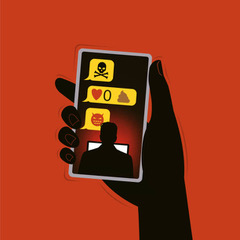 1 in 3 women in the UK report that they have experienced on-line abuse or harassment on social media or elsewhere on-line. The On-Line Safety Bill is going through the House of Lords at present.
1 in 3 women in the UK report that they have experienced on-line abuse or harassment on social media or elsewhere on-line. The On-Line Safety Bill is going through the House of Lords at present.
Harassment in Public Places
80% of women in the UK report experiencing harassment in public spaces (Suzy Lamplugh Trust). Tackling the prevalence of unwanted and aggressive behaviours such as harassment that underlie the broader cycle of violence against women and girls is a key priority.
Rape
Nearly 1 in 5 women have experienced completed or attempted rape during her lifetime.
Female Genital Mutilation
FGM is still taking place in this country and throughout the world. FGM violates all child rights and is rooted in gender inequality.
Human Trafficking & Modern Slavery
Human trafficking and Modern Slavery is a transitional activity that involves the exploitation of human rights through sale. Sadly more than half of those subjected to this crime are women and girls. Trafficking and slavery of women and girls is prevalent in almost all countries including the UK and accounts for the fastest growing business in the world.
Violence against Women with Disabilities
Disabled women and girls are more likely to be subjected to violence than non-disabled women and girls. Accessing justice and support and protection services is often impossible for women with disabilities because of accessibility, legal and other barriers.
Child Marriage
This is often the result of deeply entrenched gender inequalities. Child marriage threatens the lives, the well-being and the future of girls. Soroptimists fight against this violation of child rights and for the education of girls so that they develop their full potential.
Sexual Harassment at Work
At work places, sexual harassment and often sexual coercion has intensified as women make progress to the top. Women are targeted for their gender and for progressive roles they have adopted.
Help and Support
If you or someone you know needs help and support with any of the issues we are raising then there is help available. Do please get in touch with one of these organisations.
National Domestic Abuse Helpline 24/7 – 0808 2000 247 nationaldahelpline.org.uk
National Rape Crisis Helpline 24/7 – 0808 500 222 rapecrisis.org.uk
NSPCC – 0808 800 5000 help@nspcc.org.uk
Human Trafficking – Salvation Army Helpline 24/7 – 0800 818 3733
Modern Day Slavery Foundation Helpline – 0800 0121 700
Female Genital Mutilation – NSPCC FGM Helpline 24/7 – 0800 028 3550
Forward (FGM Advice & Support) – 0208 960 4000
National Stalking Helpline – 0808 802 0300



